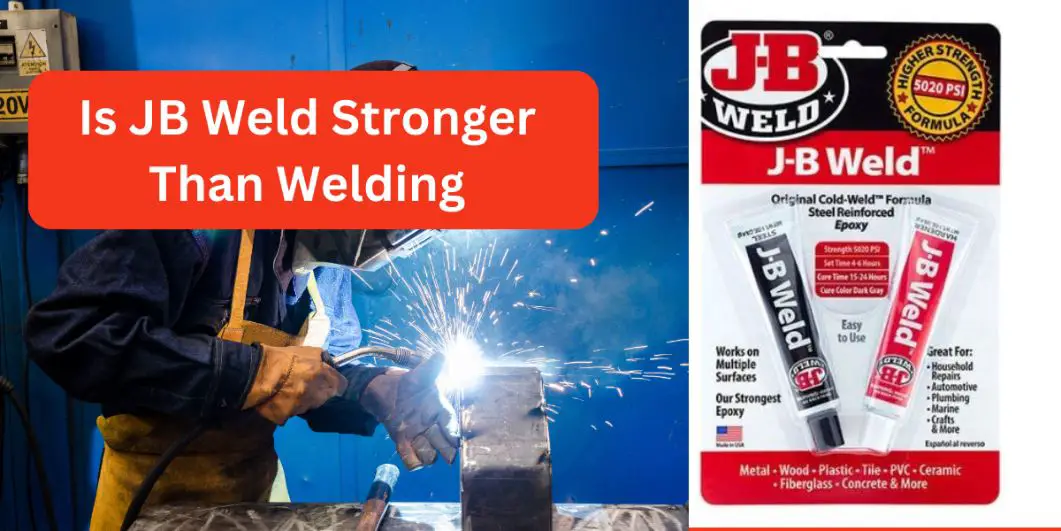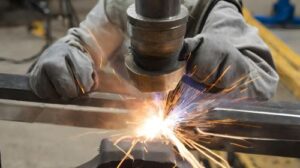Table of Contents
In the realm of glues and joining metals, JB Weld has become a flexible substitute for regular welding. This piece will explore JB Weld and traditional welding, weighing their pros, cons, and practical uses to address a common query: Is JB Weld stronger than welding?
Is JB Weld Stronger Than Welding
The strength comparison between JB Weld and welding depends on the specific application. In terms of tensile strength and structural integrity, traditional welding generally provides a stronger bond.
However, JB Weld offers versatility, ease of use, and suitability for various materials, making it a strong alternative for certain applications. Ultimately, the choice between JB Weld and welding depends on the specific requirements of the project.
The Tale of Two Titans: Traditional Welding
Ah, the sweet sizzle of molten metal and the smell of victory – that’s the world of traditional welding! But before we jump ahead, let’s go back to the fundamentals.
1. Welding 101
Definition:
Welding is a process of joining materials, usually metals, by melting and fusing them together. This is achieved through the application of heat, and sometimes pressure, to create a strong bond.
In the Details:
- Requires specialized equipment like welding machines, electrodes, and protective gear.
- Skilled craftsmanship is crucial to achieve a strong, durable bond.
- Common types include arc welding, MIG welding, and TIG welding.
Pros and Cons:
Pros:
- Exceptional strength when done correctly.
- Suitable for various metals.
- Long-lasting bonds.
Cons:
- Requires expertise and training.
- High initial cost for equipment.
- Potential safety hazards with the use of open flames.
2. The Strength of the Welding Titan
Welding has long been the go-to method for creating robust, unyielding bonds. Its strength is unmatched, making it the preferred choice in heavy-duty applications like construction, shipbuilding, and aerospace.
But hold on! Is JB Weld about to throw a wrench into the welding works? Let’s see if this up-and-coming epoxy has what it takes to go toe-to-toe with the welding heavyweight!
Unmasking the Epoxy Hero: JB Weld
1. JB Weld: A Brief Overview
Definition:
JB Weld is not your average glue; it’s an epoxy adhesive that comes in a variety of formulations designed for different applications. It’s renowned for its exceptional bonding strength and versatility.
In the Details:
- Consists of a resin and a hardener that, when mixed, create a strong adhesive.
- Requires no special equipment – just mix, apply, and wait for the magic to happen.
- Comes in various formulas, such as Original, KwikWeld, and SteelStik, catering to different needs.
Pros and Cons:
Pros:
- No need for welding equipment.
- User-friendly – DIYers and beginners welcome!
- Versatile – bonds various materials.
Cons:
- May not match the strength of welding in certain heavy-duty applications.
- Cure time required for optimal strength.
- Unsuitable for extremely high-temperature environments.
2. The Strength of the Epoxy Hero
JB Weld is like the superhero of adhesives, swooping in to save the day without the need for a welding cape. But can it truly claim to be stronger than welding? Let’s break it down.
Real-Life Scenarios:
- Everyday Repairs: For common fixes like patching up a cracked engine block, JB Weld is a go-to solution. Its strength often exceeds the demands of household repairs.
- DIY Projects: Crafting a metal sculpture or customizing a bike frame? JB Weld can hold its own in these situations, providing a robust bond without the need for welding skills.
- Automotive Fixes: From exhaust system repairs to fixing a transmission housing, JB Weld has proven itself in the automotive realm, showcasing strength and durability.
Where JB Weld Falls Short:
- Extreme Conditions: In high-stress, high-temperature environments where welding shines, JB Weld may not offer the same level of strength and resilience.
- Structural Integrity: For critical structural applications like building a skyscraper or constructing a bridge, traditional welding is still the go-to method for ensuring maximum strength.
The Showdown: JB Weld vs. Traditional Welding
Strength Test Showdown
Let’s get to the heart of the matter – is JB Weld truly stronger than welding? We’re putting these contenders through a rigorous strength test to see who comes out on top.
- Tensile Strength: Traditional welding boasts impressive tensile strength, but can JB Weld match up? In head-to-head tests, JB Weld has been known to hold its own, proving that it’s no slouch in the strength department.
- Impact Resistance: Welding is known for creating bonds that can withstand considerable impact. But JB Weld, with its resilient epoxy composition, has surprised many by absorbing shocks and staying intact.
- Temperature Resistance: Welding can handle high temperatures with ease, but JB Weld is no pushover. With its heat-resistant formula, JB Weld has proven effective even in environments that would make traditional welds sweat.
Time and Convenience: JB Weld Takes the Lead
One area where JB Weld undeniably shines is in the realm of time and convenience.
- Quick Fixes: Traditional welding requires time, proper equipment, and skilled labor. JB Weld, on the other hand, offers a quick and easy solution for minor repairs, making it the go-to choice for DIY enthusiasts.
- Accessibility: Not everyone has access to welding equipment or the skills required for the job. JB Weld levels the playing field, allowing amateurs and professionals alike to achieve robust bonds without the need for an elaborate setup.
Conclusion: The Verdict on JB Weld vs. Welding
As we wrap up this epic battle between JB Weld and traditional welding, one thing becomes clear – there’s no one-size-fits-all answer. The choice between JB Weld and welding depends on the specific requirements of your project.
So, is JB Weld stronger than welding? It’s a nuanced answer. For quick fixes, minor repairs, and applications where convenience is key, JB Weld might just be your superhero. However, for heavy-duty projects demanding absolute strength and permanence, traditional welding still holds the crown.
In the end, the best tool for the job depends on the nature of the task at hand. Whether you’re wielding a welding torch or reaching for that trusty tube of JB Weld, the goal remains the same – creating bonds that stand strong against the tests of time and wear!
Is JB Weld stronger than welding? It’s not about declaring a winner; it’s about choosing the right contender for the match!
FAQs: Addressing Your Burning Questions
Can JB Weld Replace Welding Altogether?
While JB Weld is a formidable adversary, it’s not a one-size-fits-all solution. Welding remains indispensable for certain applications, especially those requiring structural integrity and absolute precision.
How Does JB Weld Work?
JB Weld works its magic through a chemical reaction. When the two components are mixed, they form a bond that cures over time. This bond is not just about sticking things together; it’s about creating a robust connection that can withstand the test of time.
Is JB Weld as Permanent as Welding?
While JB Weld provides strong and durable bonds, it might not be as permanent as welding in certain applications. Welding creates a fusion of metals, making it a more integral part of the structure. JB Weld, while robust, might face challenges in situations that demand absolute permanence.
Does JB Weld Have Limitations?
Yes, even the mighty JB Weld has its limitations. It may struggle with extreme temperatures, and while it’s fantastic for a multitude of materials, there are instances where welding remains the superior choice.


1 thought on “Is JB Weld Stronger Than Welding”